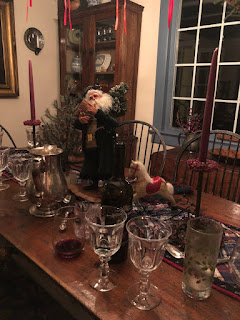This is a first, writing on Christmas morning. Normally, who has time with the bustle of family arriving, little kids prancing about, and presents to open? We should be sitting before the fire, listening to Christmas carols, and, while sipping mimosas, watching granddaughter Eleanor open gifts.
Well. Bing is crooning, and I have my cup of ginger tea, which, thank heavens, I can taste. The tree lights glow from spiny, green boughs above packages wrapped in red. Dave and I have hugged each other innumerable times, our eyes leaking tears, so grateful to have each other, to have company, for we’ll have no other visitors in this house of contagion. Yesterday, I tested positive for Covid.
Mindful of the 5.4 million people worldwide who have died from the disease, I am grateful for mild symptoms. Still, I wonder: Who? When? Where did I pick it up? It’s impossible to know. Fortified by Moderna vaccines and boosters, we have celebrated the season. Where required, we’ve worn masks and brandished vaccination cards; when among the similarly cautious, we’ve hugged as usual. We’ve been to parties, lovely inns, shops, and restaurants. Some might call us fools to frequent such spots - I feel equally uncharitable toward the unvaccinated who are, in part, responsible for prolonging this pandemic - but so it has been.
In alerting friends and informing family, I find I am far from alone. Omicron has, like an unwanted Santa, slipped into innumerable homes, isolating in their rooms kids home for the holidays, cancelling family vacations, and planting wistful grandparents back on Zoom calls. The prevalence of this disappointment makes it easier to bear.
As I generally do from November through February, I’ve had a slightly raw throat and intermittent runny nose. I’ve thought nothing of it, but given our many activities, my daughter said, “Would you consider a test before we come over Christmas day?”
Of course! We scored a test kit at CVS, apparently a rare find this Omicron Christmas, and Dave went first. We spread the sheet of instructions on the kitchen counter, then Dave swabbed, stirred, dipped, and timed the test strip as directed. In case we couldn’t easily read the results, we peered through a magnifying glass: blue line only. He was negative, and I expected the same.
Wrong.
I followed the steps as Dave had but needed no magnifying glass to detect the pink line: it glared, vibrant in accusation. We were stunned, disbelieving, and determined to get a contradiction. Earlier in the day, I’d passed the Fairfield Covid testing site and pitied those waiting; now, compelled by a pink line, I had to join them. I hopped in my car to head East.
The queue of cars had diminished, and I turned into the lot, pleased this would be a short jaunt. I rolled down my window as a uniformed attendant approached. “Appointment?” said the young man, his face nearly obscured by a mask and wool cap.
“No,” I said.
“You need an appointment.”
“But there’s hardly anyone here.”
“That’s because there are so few workers. No test without an appointment.”
“Can I make one with you now?”
“No.” He handed me a slip of paper. “This is the number and email address to contact. But you can’t stay here. Park across the street while you wait.”
Obediently, I drove to the adjacent lot and called the number but connected with neither robot nor human who could help. Frustrated, I called Dave and he pulled up the website. I listened as he growled and cursed, ultimately foiled by its intricacies. Meanwhile, my cheeks felt flushed, and my skin prickled. Oh no. The symptoms are worsening.
Resolved to get a PCR test, hoping for a negative, I swung into the test site again.
“Appointment?” said the young man.
I explained the futility of the crappy information on that stupid scrap of paper he gave me, but I said it nicely, hoping to win him over and worm my way into the line. He shook his head no and, perceiving a threat in this desperate, graying matron, summoned a security guard. “You need an appointment,” they chanted in chorus.
Agh. Fine. Enough!
For the next half hour, I toured Urgent Care centers, CVS’s, and pharmacies, hoping, without success, to secure a PCR. Resigned to missing Eleanor’s Christmas morning exuberance, I drove home.
Dave met me at the door, his smile wide. He’d called Yale New Haven and - praise God! - reached a human. “She said they’ve waived the appointment requirement in Fairfield! They don’t close ‘til 6:00. You can make it!”
My shoulders slumped at the thought of heading back, but I did, and again the young man stopped me at the entrance. “Appointment?”
I spewed, rapid-fire, the news from Yale.
“Lane 1,” he replied without argument.
Gone was the flush and the prickling sensation. I was elated! And even though this changed nothing since it takes at least 24 hours to get results, it was a triumph to get past that young pup. Plus, the nurse, an angel swathed in blue robe, mask, and shield - who’d given up her Christmas Eve with family so I might be tested – was so sympathetic upon hearing we’d miss seeing our kids.
Mission accomplished, I returned home in high spirits, bizarre given this crimp in our Christmas.
And this morning, everyone is with us. We’ve been on FaceTime with my son, his wife, little Lexi, and Paul, who demonstrated the cool attributes of his new Hess jet. Our daughter posted videos of Eleanor joyfully washing windows with the cleaning supplies she’d requested from Santa. We “visited” by phone and Facetime with other family members and friends throughout the day. So, while often I rail with frustration at technology, today it ranks with vaccines, and the science behind them, on top of my gratitude list.
.































